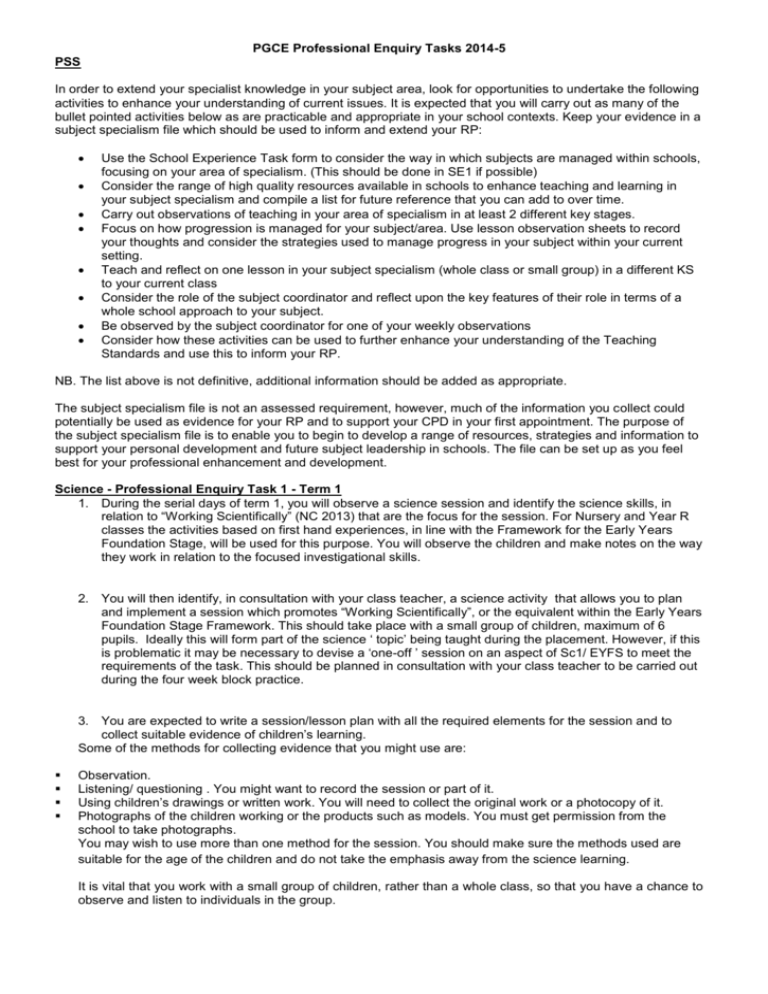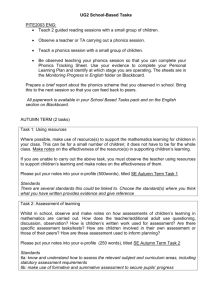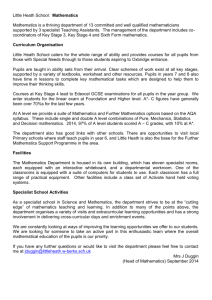Science - Professional Enquiry Task 1
advertisement

PGCE Professional Enquiry Tasks 2014-5 PSS In order to extend your specialist knowledge in your subject area, look for opportunities to undertake the following activities to enhance your understanding of current issues. It is expected that you will carry out as many of the bullet pointed activities below as are practicable and appropriate in your school contexts. Keep your evidence in a subject specialism file which should be used to inform and extend your RP: Use the School Experience Task form to consider the way in which subjects are managed within schools, focusing on your area of specialism. (This should be done in SE1 if possible) Consider the range of high quality resources available in schools to enhance teaching and learning in your subject specialism and compile a list for future reference that you can add to over time. Carry out observations of teaching in your area of specialism in at least 2 different key stages. Focus on how progression is managed for your subject/area. Use lesson observation sheets to record your thoughts and consider the strategies used to manage progress in your subject within your current setting. Teach and reflect on one lesson in your subject specialism (whole class or small group) in a different KS to your current class Consider the role of the subject coordinator and reflect upon the key features of their role in terms of a whole school approach to your subject. Be observed by the subject coordinator for one of your weekly observations Consider how these activities can be used to further enhance your understanding of the Teaching Standards and use this to inform your RP. NB. The list above is not definitive, additional information should be added as appropriate. The subject specialism file is not an assessed requirement, however, much of the information you collect could potentially be used as evidence for your RP and to support your CPD in your first appointment. The purpose of the subject specialism file is to enable you to begin to develop a range of resources, strategies and information to support your personal development and future subject leadership in schools. The file can be set up as you feel best for your professional enhancement and development. Science - Professional Enquiry Task 1 - Term 1 1. During the serial days of term 1, you will observe a science session and identify the science skills, in relation to “Working Scientifically” (NC 2013) that are the focus for the session. For Nursery and Year R classes the activities based on first hand experiences, in line with the Framework for the Early Years Foundation Stage, will be used for this purpose. You will observe the children and make notes on the way they work in relation to the focused investigational skills. 2. You will then identify, in consultation with your class teacher, a science activity that allows you to plan and implement a session which promotes “Working Scientifically”, or the equivalent within the Early Years Foundation Stage Framework. This should take place with a small group of children, maximum of 6 pupils. Ideally this will form part of the science ‘ topic’ being taught during the placement. However, if this is problematic it may be necessary to devise a ‘one-off ’ session on an aspect of Sc1/ EYFS to meet the requirements of the task. This should be planned in consultation with your class teacher to be carried out during the four week block practice. 3. You are expected to write a session/lesson plan with all the required elements for the session and to collect suitable evidence of children’s learning. Some of the methods for collecting evidence that you might use are: Observation. Listening/ questioning . You might want to record the session or part of it. Using children’s drawings or written work. You will need to collect the original work or a photocopy of it. Photographs of the children working or the products such as models. You must get permission from the school to take photographs. You may wish to use more than one method for the session. You should make sure the methods used are suitable for the age of the children and do not take the emphasis away from the science learning. It is vital that you work with a small group of children, rather than a whole class, so that you have a chance to observe and listen to individuals in the group. 4. You will be expected to bring the session/lesson plan, together with the suitable evidence for the children’s learning to share with the rest of the group at a Science session after the four week block placement. At that session you will be expected to: a) Share the session/lesson plan and justify the activity in relation to the investigative focus. b) Describe how the work was carried out and critically analyse the outcomes. c) Demonstrate a clear and accurate understanding on what constitutes “ Scientific Enquiry” in relation to the National Curriculum Science (2000) d) Demonstrate appropriate understanding of the relationship between the National Curriculum (NC) for Science and the Early Years Foundation Stage Framework. e) Provide appropriate evidence to support claims made in relation to children’s learning and the critical analysis of the session. Science - Professional Enquiry Task 2 – Term 2 In consultation with the class teacher, the trainee teacher will select three children whose science understanding is below average, average and above average within the class. If possible one should be a child with SEND OR EAL. The trainee teacher will evaluate and reflect on the impact of their input (teaching or supporting the teacher) on these children’s learning and progress in science. This could be for one lesson, or better still over a series of lessons. You should find evidence to support your comments. This could be in the form of observation, listening/ response to questioning, key points, using children’s drawings or written work (you will need to collect the original work or a photocopy of it), lesson observations from teacher, comments from your own lesson evaluations.., or any other methods that are appropriate. During the summer term you will be expected to bring the evidence to a science session and to take part in a discussion, using the evidence to demonstrate to other trainee teachers that progress has taken place. There will be opportunities during this session to compare the achievements of other children of a similar age, and to take part in discussions about children’s work from other years. This will help the trainee to develop their understanding of how their teaching impacts on children’s learning, and what constitutes evidence of achievement. Maths PETs SE1 Questioning When observing mathematics lessons focus on questioning. Listen to the questions the teacher asks and the ways in which children respond. Make a note of the questions asked that particularly require children to think. e-profile: SE1 – Questioning Add an entry to your mathematics e-profile listing the questions you have heard that particularly require children to think. Number/calculation Identify a group of children who are encountering difficulties with an aspect of number/calculation. Design an activity/intervention to help them to develop their understanding. Evaluate how effective your activity/intervention was. What worked and why? What implications does this have for your wider mathematics teaching? e-profile: SE1 – Number/calculation Evaluate the activity/intervention you used. What worked and why? What implications does this have for your wider mathematics teaching SE2 Lesson Study Lesson Study is a form of classroom action research focusing on the development of teacher practice (see Blackboard for more information). It involves collaboratively planning, teaching, observing and analysing learning and teaching in ‘research lessons’. Use aspects of the Lesson Study approach (as listed below) to develop a specific teaching technique (e.g. you could focus on the way you model the mathematics to the children, how you develop opportunities for children to talk and discuss mathematics, effective use of questioning, appropriate differentiation, use of models, images and resources etc.). 1. 2. 3. 4. 5. 6. With your class teacher jointly identify the teaching technique you want to develop in mathematics during SE2. Identify around three ‘case pupils’ – this could be a high, middle and lower attaining pupil. With the teacher jointly plan a ‘research lesson’ that makes use of the teaching technique you want to develop. While you are teaching the lesson ask the teacher to observe by focusing only on the case pupils’ learning and their progress. Hold a post research lesson discussion analysing how the case pupils responded, what progress they made, what evidence of learning or difficulties with learning they displayed and what can be learned about the way the teaching or learning approach is further developed. Continue to develop this approach to develop appropriate teaching strategies in mathematics. Now reverse roles so that you have the opportunity to closely focus on the case pupils during a lesson the teacher teaches using the same technique. e-profile: SE2 - Lesson study Write 500 words outlining what you have learnt about teaching mathematics from this experience, particularly focusing on the technique you were developing. SE3 Parents During SE3 send home some ideas of mathematics tasks/activities/games that parents and children can do together. Try to relate these to the mathematics that the children are learning in school. e-profile: SE3 - Parents Attach the ideas you send home to parents to an e-profile entry and reflect on any feedback you received from the parents and/or the children. Assessment Find out about the approaches your school uses for summative assessment in mathematics e-profile: SE3 - Summative assessment By the end of week 40 (01/06/15) write an e-profile outlining the challenges of making summative judgments in mathematics. Computing PETs For every School Experience, please ensure you find out the school’s Acceptable Use Policy and be aware of esafety protocols in place SE1 – plan and deliver a lesson, using a resource promoting computer programming e.g. Scratch, Logo, Beebots etc., with a small group of pupils to develop computational thinking. Upload your SKLP, lesson plan and a 300 word reflection to your e-journal by 3.00 pm on Monday 22nd December 2014. SE2 – use technology in a cross curricular manner to enhance learning. Upload your lesson plan and a 300 word reflection by 3.00 pm on Friday 17th April 2015. SE3 – use an element of computer science to plan and deliver three progressive sessions developing computational thinking e.g. Beebots, Logo, Flowol, Scratch etc. Upload your SKLP, lesson plans and a 300 word reflection by 3.00 pm on Friday 26th June 2015. For students completing a SEND placement, the school based tasks will be personalised, to meet the specific needs of the pupils. English PETS 1. Phonics Tasks You will complete Phonics tasks on School Experiences One and Two. Each task consists of: An observation of a phonics session being taught, either by the class teacher or a Teaching Assistant. Planning, teaching and evaluating a phonics session. This does not have to be a whole class lesson and can be carried out with a group of children. The aim of the task is to enable you to develop your subject knowledge of grapheme/phoneme correspondences and to practise using the terminology, segmenting and blending. Being observed teaching phonics to provide you with feedback about your progress. It would be valuable to keep copies of these sessions in your SE file and your RP. 2. Reading Tasks: a) Reading Interview (SE1) b) Guided Reading (SE2) a) See details on ‘Reading Interview’ sheet. b) You should negotiate with your teacher/mentor to work with a group of children (6 maximum) on Guided Reading. Over the course of the school experience, you will be expected to: Collect evidence about the children’s reading ability. Collaborate with the class teacher in order to plan, teach and assess at least one Guided Reading session, lasting about 20 minutes. Use the planning pro-forma provided. Set clear targets and learning objectives for the group of children. Assess the children and gather evidence of their progress and attainment. Clearly record your findings. If appropriate, ensure that your plan includes a focus on phonic skills. Your school may still be using APP (Assessing Pupil Progress) in which case it may be plan, teach and assess one or more of the Assessment Foci for Reading. used to help you to 3. Grammar Task School Experience One only Using the pro-forma provided, plan and teach a grammar session to a small group of children or the whole class if you wish. Consult and co-plan with your teacher in order to ensure that your lesson builds upon previous learning and that you include new learning. Use the lesson to inform your SKLP and reference it in your RP. You will be guided by English tutors on how to complete these tasks and they will be submitted in your English Profiles. DIRECTED STUDY TASKS These will be explained in sessions but checklists are provided so that you can ensure that all items are submitted in your English Profiles. Report on school’s approach to teaching reading (Pre-course Journal) Group planning and presentation of phonics lesson – Week 3 In order to audit your grammatical subject knowledge, it is advisable to take Level 6 SPaG test online. https://www.gov.uk/government/uploads/system/uploads/attachment_data/file/182324/sample_ks2_l6_english_gr ammarpunctationandspelling_shortanswer.pdf Phonics Audits 1, 2 and 3 Subject Knowledge Learning Plans 1 and 2 Group Guided Reading Presentation – Week 21 Feedback will be provided by tutors on your Profile feedback RAG form. Professional Enquiry Task (to be completed during most appropriate placement): The Entitlement of Pupils in Mainstream Schools – SEN Provision – The Local Offer Aims of the task Professional Standards addressed: • Promote good progress and outcomes by pupils (S2) • Fulfil wider professional responsibilities (S8) • Have a knowledge and understanding of a range of teaching, learning and behaviour management strategies and know how to use and adapt them, including how to personalise learning and provide opportunities for all learners to achieve their potential. (Q10) • Know how to make effective personalised provision for those they teach, including those for whom English is an additional language or who have special educational needs or disabilities, and how to take practical account of diversity and promote equality and inclusion in their teaching (Q19) How to carry out the task This task will enable you to take a practical approach to the new changes in legislation taking place from September 2014. Schools will have been working hard to put strategies in place to ensure they are compliant with new guidance including responding to the Local Offer within their Local Authorities and putting together a school response – looking at how they ensure that all children’s needs are met – either through high quality teaching, interventions, working with outside agencies, parents and carers. You will need to work with the SENCo on this task – finding out the planning processes which have taken place over last academic year and how the school are responding to the new legislation, particularly looking at• • • • The Local Offer The Graduated Response to planning and assessment (including levels of intervention) The Plan Involvement with Parents and Carers This task should take the form of a commentary of approximately 1000 words which may include links to school documentation (ethical considerations to be adhered to). This task should form part of your RP and will help you to provide evidence for reflective practice. Please ensure that this task is included in your RP folder to be checked at the end of your final teaching practice by the SENCo who will add a reflective comment to support your work.







